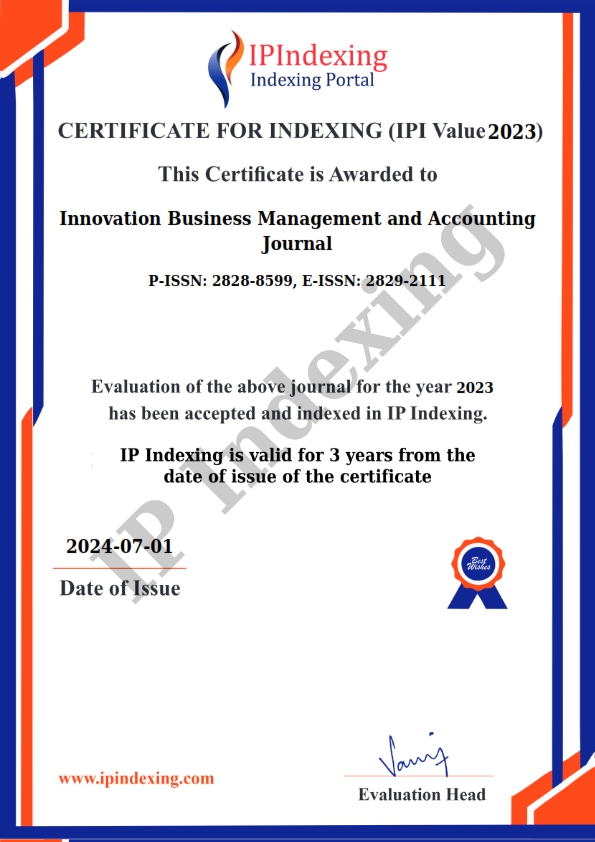The Role of Work Motivation, Work Discipline, and Work Ethic in Improving Employee Performance
DOI:
https://doi.org/10.56070/ibmaj.2024.021Keywords:
Discipline, Motivation, Performance, Work EthicAbstract
The aim of this research is to describe motivation, discipline, work ethic and employee performance and analyze the level of significance of the influence of motivation, discipline and work ethic simultaneously, partially and dominantly on the performance of PT. Kerry Express Indonesia. This research is causal comparative and explanatory. The investigation was conducted at PT. Kerry Express Indonesia. This research includes all 60 employees at PT. Kerry Express Indonesia as the population and sample. Due to the manageable size of the population, a census research approach was employed, involving all employees as respondents. The analysis conducted includes descriptive analysis and multiple linear regression analysis, which will be subsequently assessed for hypotheses. The study findings indicate that motivation, work discipline, and work ethic have a notable impact on the performance of employees at PT Kerry Express Indonesia. Employee performance is positively influenced by motivation, work discipline, and work ethic, which result in timely completion of tasks in response to instructions. The most influential factor on employee effectiveness is their work ethic. This research can be utilized as input for PT. Kerry Express Indonesia to assess employees' attitudes towards work motivation, work discipline, and work ethic, as a strategic measure to enhance the company's performance.
Downloads
References
Aflah, K. N., Suharnomo, S., Mas’ud, F., & Mursid, A. (2021). Islamic Work Ethics and Employee Performance: The Role of Islamic Motivation, Affective Commitment, and Job Satisfaction. Journal of Asian Finance, Economics and Business, 8(1), 997-1007. https://doi.org/10.13106/jafeb.2021.vol8.no1.997
Andreas, D. (2022). Employee Performance: The Effect Of Motivation And Job Satisfaction. PRODUKTIF: Jurnal Kepegawaian dan Organisasi, 1(1), 28-35. https://doi.org/10.37481/jko.v1i1.10
Anwar, G., & Abdullah, N. N. (2021). The impact of Human resource management practice on organizational performance. International Journal of Engineering, Business and Management, 5(1), 35-47. https://doi.org/10.22161/ijebm.5.1.4
Efendi, R., Rifa’i, M. N., Bahrun, K., Milla, H., & Suharmi. (2020). The Mediation of Work Motivation on the Effects of Work Discipline and Compensation on Performance Batik MSMEs Employees in Yogyakarta City, Indonesia. International Journal of Multicultural and Multireligious Understanding, 7(1), 689-703. https://doi.org/10.18415/ijmmu.v7i1.1375
Ehnert, I. A., Matthews, B., & Muller-Camen, M. (2020). Common Good HRM: A paradigm shift in Sustainable HRM? Human Resource Management Review, 30(3), 100705. https://doi.org/10.1016/j.hrmr.2019.100705
Enny, M. (2019). Manajemen Sumber Daya Manusia. UBHARA Manajemen Press.
Ensslin, S. R., Welter, L. M., & Pedersini, D. R. (2021). Performance evaluation: a comparative study between public and private sectors. International Journal of Productivity and Performance Management, 71(5), 1761-1785. https://doi.org/10.1108/ijppm-04-2020-0146
Ernest, A. (2021). Discipline And Achievement Of Organizational Objectives. International Journal of Institutional Leadership, Policy and Management, 3(3), 471-489.
Malayu, H. (2016). Manajemen Sumber Daya Manusia Edisi Revisi. PT. Bumi Aksara.
Mangkunegara, A. P. (2017). Manajemen Sumber Daya Manusia Perusahaan. Remaja Rosdakarya.
Murphy, K. R. (2019). Performance evaluation will not die, but it should. Human Resource Management Journal, 30(1), 13-31. https://doi.org/10.1111/1748-8583.12259
Pan, Y., Froese, F., Liu, N., Hu, Y., & Ye, M. (2021). The adoption of artificial intelligence in employee recruitment: The influence of contextual factors. The International Journal of Human Resource Management, 33(6), 1125-1147. https://doi.org/10.1080/09585192.2021.1879206
Piwowar-Sulej, K. (2021). Human resources development as an element of sustainable HRM - with the focus on production engineers. J Clean Prod, 278, 124008. https://doi.org/10.1016/j.jclepro.2020.124008
Rivaldo, Y., & Nabella, S. D. (2023). Employee Performance: Education, Training, Experience and Work Discipline. Quality - Access to Success, 24(193), 182-188. https://doi.org/10.47750/qas/24.193.20
Rizki, V. L., & Sulistyan, R. B. (2022). Manajemen Sumber Daya Manusia. Widya Gama Press.
Stofkova, Z., & Sukalova, V. (2020). Sustainable Development of Human Resources in Globalization Period. Sustainability, 12(18), 7681. https://doi.org/10.3390/su12187681
Sulistyan, R. B., Carito, D. W., Cahyaningati, R., Taufik, M., Kasno, K., & Samsuranto, S. (2022). Identification of Human Resources in the Application of SME Technology. Wiga : Jurnal Penelitian Ilmu Ekonomi, 22(1), 70-76. https://doi.org/10.30741/wiga.v12i1.799
Wabia, D., Saerang, D. P., & Taroreh, R. N. (2021). The Effect of Organizational Culture, Work Discipline, and Communication Competency, on Employee Performance in The Regional Financial Management Agency of Tambrauw Regency, West Papua Province. International Journal of Culture and Modernity, 5, 46-64.
Downloads
Published
How to Cite
Issue
Section
License
Copyright (c) 2024 Nadya Sriagustin Hosen, Mokhamad Natsir, Boge Triatmanto

This work is licensed under a Creative Commons Attribution-ShareAlike 4.0 International License.



